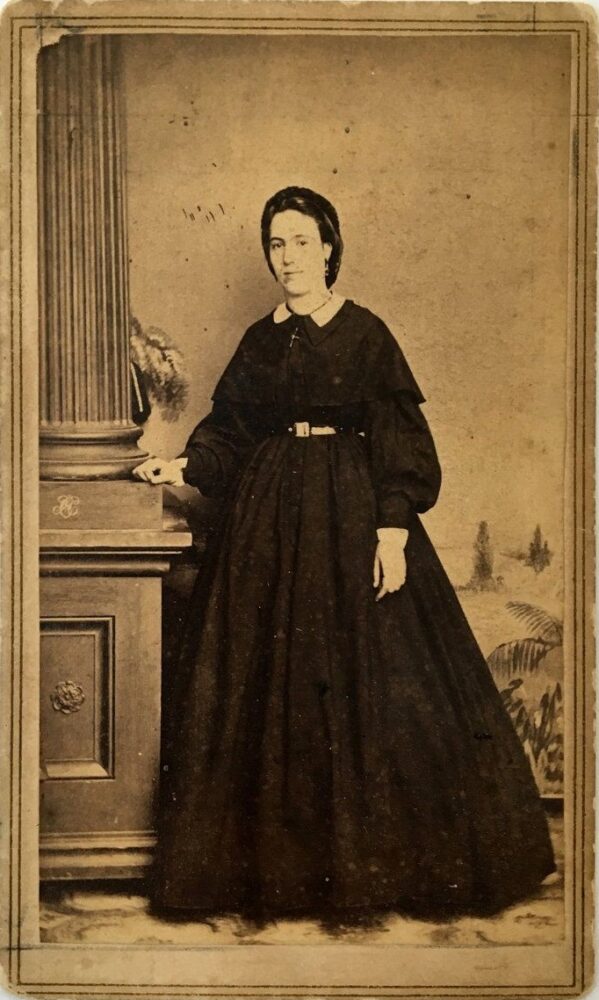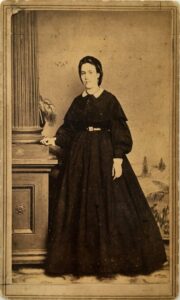Henriette Delille
Henriette Delille was a free Afro-Creole woman who founded sodalities, or religious sororities, for women of African descent that dedicated themselves to the care of the poor, the enslaved, and free people of color.

Sisters of the Holy Family
The only photograph of Delille, ca. 1855.
Henriette Delille (1812–1862) was a free Afro-Creole woman in New Orleans who, in 1842, founded the Sisters of the Holy Family, a congregation of Afro-Creole religious sisters, or nuns, dedicated to the care of the poorest of the poor, the enslaved, and free people of color. She expanded her charitable works to include poor whites during the yellow fever epidemics of the 1850s. Though Delille died in 1862, her congregation continues today.
Delille was born on Burgundy Street in New Orleans in 1812. Her mother, Marie Josephe Diaz, was a free Afro-Creole woman. Her father was likely Jean Baptiste Delille Sarpy, a Louisiana merchant. In Louisiana, as in the rest of the United States, one’s status as free or slave followed that of the mother. Though Delille and her mother were free, earlier known female ancestors had been enslaved until they purchased their freedom from their owners. Delille’s first Louisiana ancestors were Claude Josephe Dubreuil, the contractor for the King of France, and her great-great-grandmother, Marie Anne, dit (known as) Nanette, an enslaved African most likely from the Senegambia region of West Africa. Nanette would have been enslaved in Africa, forced aboard a slave ship, and sold as a domestic to Dubreuil in New Orleans. Nanette and Dubreuil both arrived in New Orleans in approximately 1719. They produced five children together, though Dubreuil never freed them. Instead, decades later, they purchased their freedom and the freedom of their children.
In addition to being an heir to slavery, Delille was an heir to Catholicism. She attended mass with her mother at Saint Louis Cathedral in New Orleans and was baptized there. As a young girl she attended the Saint Claude Street School, which was solely for the educations of free girls of color. She was educated by the French missionary Sister Sainte Marthe Fontière, and as a Sister of the Holy Family remembered years later, would meet at the school chapel every day with childhood friends Juliette Gaudin and Josephine Charles, praying that they would discover the delights of doing good, feeding the poor, and teaching catechism to the neglected.
In 1842 Delille founded another sodality for women of African descent, the Sisters of the Holy Family, this despite laws aimed at curtailing the number and movement of free people of color. Increasingly restrictive laws also forbade them to congregate together or with slaves. In direct defiance of the laws, Delille, together with Afro-Creole friends Juliette Gaudin and Josephine Charles, moved into a small house on Saint Bernard Street. Delille named the house the House of the Holy Family. Eight long years later, in the latter months of 1850, Delille began her training in religious life. Custom has it that Bishop Antoine Blanc, knowing Delille would be shunned by the religious communities of white women in New Orleans, arranged for her to enter the novitiate at the Religious of the Sacred Heart in Saint James Parish. That same year she purchased a house on Bayou Road near Rampart Street that she converted into a convent. It was less than a block away from Saint Augustine’s Catholic Church in Treme. In 1851 she professed her vows at Saint Mary’s Chapel, which is located at the Old Ursuline Convent on Chartres Street in New Orleans. At her death in 1862, Delille was praised in her obituary for founding the House of the Holy Family and commended for her dedication to the poor, the young, and the enslaved. She was, it concluded, “a servant of slaves.”
By the 1960s the Sisters of the Holy Family grew to include hundreds of African-descended women. Their numbers allowed them to broaden their outreach to their community. They founded orphanages, nursing homes, and schools throughout Louisiana. They eventually expanded their ministry to several other states in the United States, Belize in Central America, and Nigeria in West Africa.
On March 9, 2011, Archbishop Gregory Aymond urged his followers to seek an end to racial injustice in the streets of New Orleans by distributing a prayer card entitled, “The New Battle of New Orleans: Violence, Murder, Racism: Our Family Prayer.” The prayer calls for the intercession of Our Lady of Prompt Succor as well as Henriette Delille. Prayers to Our Lady of Prompt Succor are a two-centuries-long tradition in the city. Delille’s inclusion aptly calls attention to her life as a model of social justice.
Today the Congregation for the Causes for Saints in Rome is examining the potential canonization of Delille. A cause for canonization is a lengthy and complex process conducted by the Roman Catholic Church that considers whether a person can be declared a saint. The cause for Delille was submitted to Rome in 1988 when Archbishop Philip Hannan of New Orleans requested that the Congregation allow the Sisters of the Holy Family to proceed with the initial steps to begin the process. On March 2, 2010, the Congregation unanimously and enthusiastically approved Delille’s practice of heroic virtue, defined as the performance of extraordinary virtuous actions exhibited over a lifetime. On March 27, 2010, Pope Benedict XVI bestowed on Delille the title of Venerable. The next step in the canonization process is the approval of a miracle attributed to the intercession by Delille. If or when a miracle is approved, Delille would be beatified, or declared a saint, in New Orleans.
